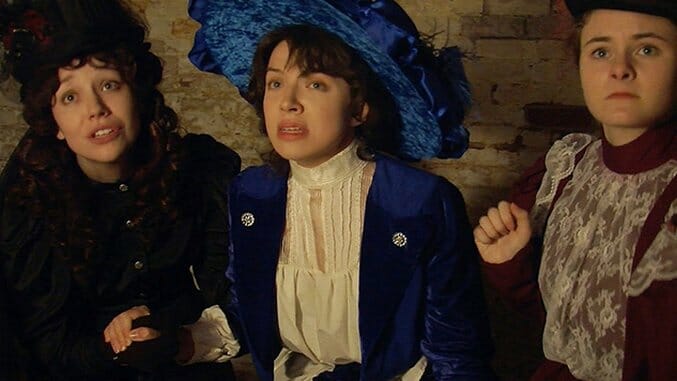10 Days in a Madhouse

There should be no doubt in any historian’s mind that Nellie Bly was a pioneer: The writer formerly known as Elizabeth Jane Cochran became one of the United States’ first investigative reporters, she was an around-the-world solo adventurer (in about 80 days), and later, she distinguished herself as an industrialist—the fact that she lived such an accomplished life as a woman in the late 19th and early 20th century is simply mind-boggling. Taking on Bly’s biopic would be a challenge for anyone who’d try to capture the woman’s ferocity and fearlessness, without turning the character into a caricature. 10 Days in a Madhouse, written and directed by Timothy Hines (War of the Worlds – The True Story), sagaciously narrows down the scope of Bly’s biography to a pivotal episode in her journalistic career—focusing on her time as an embedded reporter in an asylum—but it’s thwarted by one-dimensional characters, awkward, hammy acting and clumsy dialogue.
Though it’s meant to be a straight-up drama, 10 Days in a Madhouse’s opening scene nearly reaches the heights of B-movie camp. A woman in restraints and a bloodied hospital gown writhes in pain on a medical table. She’s held down by two nurses as a nervous doctor in a suit prepares a syringe. Cue the scary music as Dr. Dent (a raspy-voiced Christopher Lambert), the superintendent of the facility, enters the dark room to observe. Within minutes of the treatment, the patient convulses and dies. Dent orders the attending physician to stop revival attempts. “Enough! Send her to the crematorium…I will make out the papers,” he yells. The only elements missing from this wooden exchange are thunder, lightning and a mad scientist’s cackling.
We first meet Nellie Bly (Caroline Barry) in 1887, after a fascinating opening credit sequence that combines archival photos of New York City with a touch of animation—the effect is haunting (and one of the best parts of the film)—she’s 23, plucky, perky and ever the optimist. Her ebullient attitude fails to impress the taciturn Joseph Pulitzer (Sam Davidow), who’s hesitant about a woman on staff at The World News. Her new editor John Cockerill (Bob Olin), however, is willing to give her a tryout: She must infiltrate Blackwell’s Island Asylum for Women to investigate allegations of mistreatment of patients.
Bly decides to feign mental illness to get properly committed, but Cockerill doesn’t have an escape strategy to get her out. Undeterred by missing this key part of the plan, she smiles oddly throughout their exchange, to the point of distraction. Her editor finally says what we’ve all been thinking: “I am afraid of that chronic smile of yours.” “I will smile no more,” she responds, with yet another smile. It’s all too much: We understand that this is the cub reporter’s first big break, but the acting choices in this scene, and many others that follow, are just peculiar. Barry’s better at conveying a sanguine Bly than she is depicting the grittiness required of the reporter’s time at Blackwell’s. The nuance of fear and excitement needed at a torturous mental institution isn’t the newcomer’s forte.
-

-

-

-

-

-

-

-

-

-

-

-

-

-

-

-

-

-

-

-

-

-

-

-

-

-

-

-

-

-

-

-

-

-

-

-

-

-

-

-








































